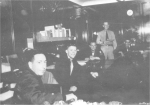
| 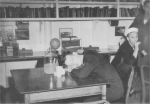
|
Please report any broken links or trouble you might come across to the Webmaster. Please take a moment to let us know so that we can correct any problems and make your visit as enjoyable and as informative as possible.
All images in this section are taken from the cruise book. Narrative has been transposed and added to the photos where appropriate.
"The crew sobered a few days later when the Captain told them they were in dangerous waters. All hands were ordered to carry life jackets. The tense feeling didn't last long. Even wearing a life jacket can be fun. Ward came from the medical storeroom wearing the bustle type. Piast tied the top and bottom fasteners of each side, turned it wrong side out, and wore it looking a visitor from Mars. Someone discovered that the kapok linings made excellent pillows. The canvas cover was much easier to carry without the insides, especially since the insides felt so comfortable under the mattress.
News came from the radio shack that the British ship 'Dorchester' had sunk the German submarine supply ship, the 'Python'. The victim had been refueling and supplying subs in the vicinity of St. Helena. That Island was near! Halfway around the world, Hell broke loose that day, 7 December 1941. The kapok returned to the life jackets, and the life jackets returned to the men's backs.
The Master at arms went about keeping all hands away from the rail. The sight of land had drawn everyone topside. The ship's policy was to keep the rails clear of draped men. McKibben never understood why he couldn't sit on th 'fence'".
Cape Town reminded many of California. Closer inspection, however, revealed the lack of rain. The modern city disappointed those who had expected naked savages and mud huts. High above the city stood Table Mountain, eternal guardian of the city climbing at its feet. Cloud formations spread cloth-like over the top because of the constant wind. Devil's Peak, beside Table Mountain, was the Townspeople's point of vantage for the convoy entering the harbor.
The Capetowners took the deluge of soldiers and sailors in their stride, providing transportation and tours. The cars followed a route through the gardened city, around Devil's Peak, into the Cecil Rhodes estate, down the valley through Rondebush and Wyndcoup to the Dutch settlement. Whitewashed houses with thatched roofs lined the road to Kerstenbosh, the wild flower preserve. More exciting, perhaps, was surfboarding at the beach at Musenberg with its nine miles of white sanded beach.
Supplies were received aboard labeled 'H.M.S. Mount Vermin'.
With regret, the convoy left Cape town, rounded the Cape of Good Hope and sailed into the Indian Ocean. Where next? The scuttlebutt said 'Bombay'. And Bombay it was--for all the convoy except the 'Mount Vernon'. British Naval passengers aboard were transferred at sea to the British escort. The 'M.V.' turned about."
Christmas in the tropics was new to the men. Their memories of the day had included snow and lighted trees, holly and the snapping of logs burning the fireplace. Christmas meant plum pudding and spiced apples. Christmas meant home.
The ship moored that day in Mombassa, Kenya Colony, Africa. Mombassa was the idea of Africa which lives in the mind of the adventurer. It was the color of the jungle; unwanted orchids hacked from the trees by gardeners, basket weavers at work in the street, grasshopper cakes frying over charcoal, red fezed, nighshirted man pedalling his sewing machine.
The Hindus who operated the stores enjoyed the bartering as much as the selling. The crew was initiated into th salesmanship rules of the East. The sale is secondary to the art of wrangling for the final cost. The price of animals was so small they appeared aboard ship; monkeys, dogs, even a goat.
On the quarterdeck. Lieutenant Kirkpatrick, found a little gray monkey hiding. Attempting to be friendly, the OOD reached to pet the monkey. Covering its face with its hands, the little fellow cringed and shuddered. The OOD went closer. Eyeing the hand, the monkey suddenly grabbed with both fists, bit, wrinkled up his nose and spat.
The sentry ran aboard and reported. 'Mr. Kirkpatrick, look, sir.' What they saw was an elephant, being led to the ship by its owner, a sailor.
Stores arrived aboard in straw filled crates of bamboo or palm frond. Where oranges, apples, tomatoes, and papaya belonged, millions of cockroaches thrived. The progeny are still ship's company. Eggs (two dozen count) were packed in the same type of crate. The bakers discovered that the African count for twenty-four was sometimes eight. Sides of meat came aboard: water buffalo with a refreshing wild flavor. Some cuts were tender, but most were like piano wire or shredded wheat. Dr. Taber was forced to issue warning about eating green fruit; too many were joining the Head Trotters Club.

| 
|
From Mombassa, the ship sailed to Addu Atoll, Maldive Island group. Seated on the equator, the tiny island was the perfect movie setting for a Dottie Lamour film. Under way again, the captain told all hands they were going into combat area--Singapore.
The next afternoon, under a clear sky, the ship sailed into the Jahore Straits. The channel was narrow and the ship could not maneuver. After proceeding well into the channel the ship had to halt to allow a floating mine to slip by, missing the ship by a foot. The British ship following exploded the mine with rifle fire.
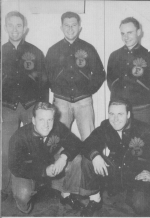
| 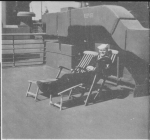
| 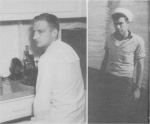
| 
| 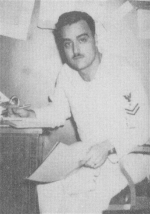
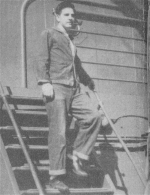

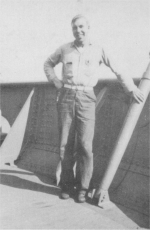
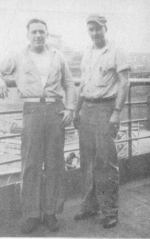
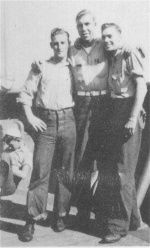

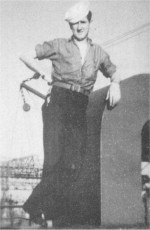
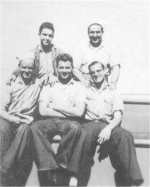
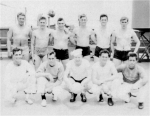
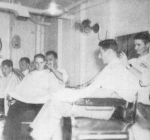
|
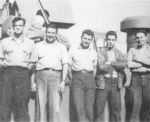
| 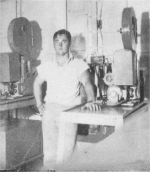
| 
| 
|
The radios picked up an air raid warning: There were Jap planes coming. When the red circled bombers of the Nipponese flew into sight, rain clouds blew over and a heavy rain screened the ship from view.
The 'M.V.' tied up to debark troops.* A British oil tanker came alongside to fuel. The tanker's claim was that every ship she had fueled had been lost within three weeks. The 'M.V.' ruined her record by staying afloat. Bartering for souvenirs began between both ships. The crew wanted Singapore momentos, the British wanted cigarettes.
There was no liberty, as the city was under enemy siege but somehow all hands managed to get off the ship.
Dog fights between Jap and British planes became commonplace.
Thursday morning 15 January is the day still discussed. At 0945 an air raid alarm sent the ship to General Quarters. All morning, tense with excitement, the ship waited, the gun crews aware that our guns were not enough. It was still cloudy. All the city lay in complete silence. At 1230, Condition II was set. Half the battle stations crews went to chow. The chow line had just grown from the after mess hall out onto the fan tail, when a Jap plane dropped six bombs. Fortunately they landed in a field about a hundred yards from the ship. The ominous sight was their pattern: the exact length of the ship. The gunner's mates were to keep the guns ready for action for the next four years. This was the only occasion for their use.

| 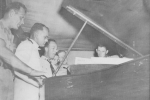
|
It was time to leave. The ship pulled out for Aden, Arabia. Life aboard resumed its usual routine. The empty passageways were both relieving and haunting.
The peak of the volcano that was Aden appeared, and grew larger until, moored in the shadow of the towering mountain, the ship sent liberty parties ashore in motor launches. As soon as the sailors reached the beach they were deluged by a swarm of taxi drivers, money changers, jewelry merchants, and beggars--'Bakseesh Badseesh!!'"
Mothers offered their children for sale. After an hour's haggling over the fares and points of interest, the cabs set out to show off Aden, traveling from the port city, Lawahi, over the rise toward the narrow passage through the mountains. This pass was the 'Needle's Eye', hopefully connected with the 'Needle's Eye' mentioned in the Bible. It wa too narrow for more than one cab at a time, and the drivers horns screaming, raced for the pass, each side hoping to be first, and trusting to brakes to stop the cars in time in event of a tie.
As the sailors entered Crater City, the real Aden, it appeared to them that long ago time had politely, but firmly stopped. Houses made from sun=dried mud, traversed by twisting, narrow lanes, filled with Jews, Turks, and goats, gave off a stench that soon benumbed the nostrils. It was necessary to barter for purchases here. If the dealer asked $300.00, on offered $3.00, and eventually the two agreed on a price of about $30.00. Still, the winner of the deal was always the shopkeeper. The crew soon voted Aden the training ground for all Pawnbrokers. Commander Darden, Lt. Cdr Esling, Norman Wachel, Herb Lundmark, and A.C. Woodward escorted the butcher, Joe Karem as interpreter, to purchase native rugs from Crater City. He spoke Arabic, and proved invaluable to the purchasers.
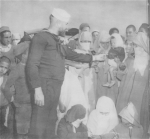
| 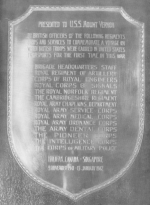
|
It was possible after the usual haggling with the drivers, to make a tour out past the modern Allied airfield into Arab City, a town centuries old, where the Camel was the motive power for running the machinery that pumped water. ground meal, and turned windlasses."
* The British troops dropped at Singapore would a few weeks later become prisoners of the Japanese - William H. Hively CW04 USNR-Ret.| Comments, Suggestions, E-mail Webmaster. |
|
This page is created and maintained by Gary P. Priolo |